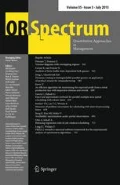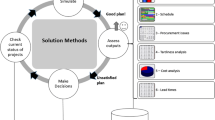Abstract
A new generic negotiation-based mechanism to coordinate project planning software agents to share resources among projects is described. The mechanism, which takes into account asymmetric information and opportunistic behavior, is concretized for the decentralized resource constrained multi-project scheduling problem, and evaluated on 80 benchmark instances taken from the literature and 60 newly generated instances. Computational tests show that the proposed mechanism comes close to results obtained by central solution methods. For twelve benchmark instances new best solutions could be computed.
Similar content being viewed by others
References
Agnetis A, Mirchandani PB, Pacciarelli D, Pacifici A (2004) Scheduling problems with two competing agents. Oper Res 52(2): 229–242
Agnetis A, Pacciarelli D, Pacifici A (2007) Combinatorial models for multi-agent scheduling problems. In: Levner E (ed) Multiprocessor scheduling, theory and applications. I-tech Education and Publishing, Vienna, pp 436–482
Albrecht M, Püttmann C, Scheckenbach B, Stadtler H, Braun H (2006) Recommendation for collaborative planning interface for service sc at the master planning level of an APS. Report 2.5, RWTH Aachen University. 15 January 2008. http://www.fir.rwth-aachen.de/projektseiten/incoco/files/DL_2_5.pdf
Beyer H-G, Schwefel H-P (2002) Evolution strategies. Nat Comput 1(1): 3–52
Bichler M, Kersten GE, Strecker S (2003) Towards a structured design of electronic negotiations. Group Decis and Negot 12: 311–335
Blazewicz J, Lenstra JK, Rinnooy Kan AHG (1983) Scheduling subject to resource constraints: classification and complexity. Discret Appl Math 5: 11–24
Bouleimen K, Lecocq H (2003) A new efficient simulated annealing algorithm for the resource constrained project scheduling problem and its multiple mode version. Eur J Oper Res 149(2): 268–281
Brucker P, Drexl A, Möhring R, Neumann K, Pesch E (1999) Resource-constrained project scheduling: notation, classification, models and methods. Eur J Oper Res 112(1): 3–41
Clearwater SH (1996) Market-based control—a paradigm for distributed resource allocation. World Scientific Publishing Company, Singapore
Cohen I, Golany B, Shtub A (2005) Managing stochastic, finite capacity, multi-project systems through the cross-entropy methodology. Ann Oper Res 134: 183–199
Confessore G, Giordani S, Rismondo S (2002) An auction based approach in decentralized project scheduling. In: Proceedings of the 8th international workshop on project management and scheduling. pp 110–113
Confessore G, Giordani S, Rismondo S (2007) A market-based multi-agent system model for decentralized multi-project scheduling. Ann Oper Res 150(1): 115–135
Dangelmaier W, Heidenreich J, Pape U (2005) Supply chain management: a multi-agent system for collaborative production planning. In: Cheung W, Hsu J (eds) Proceedings of the 2005 IEEE international conference on e-technology, e-commerce and e-service. IEEE Computer Society, Washington, DC, USA, pp 309–314
Dangelmaier W, Pape U, Rüther M (2003) Ein dezentrales Planungs- und Steuerungssystem für die Beschaffung von Sekundärbedarfen innerhalb der Supply Chain. In: Spengler T, Voß S, Kopfer H (eds) Logistik Management, Prozesse, Systeme, Ausbildung. Physica, Heidelberg, pp 133–145
Davis EW (1975) Project network summary measures and constrained—resource scheduling. IIE Trans 7(2): 132–142
Debels D, Vanhoucke M (2007) A decomposition-based genetic algorithm for the resource-constrained project scheduling problem. Oper Res 55(3): 457–469
Debels D, De Reyck B, Leus R, Vanhoucke M (2006) A hybrid scatter search/electromagnetism meta- heuristic for project scheduling. Eur J Oper Res 169(2): 638–653
Drexl A (1991) Scheduling of project networks by job assignment. Manag Sci 37: 1590–1602
Dudek G, Stadtler H (2007) Negotiation-based collaborative planning in divergent two-tier supply chains. Intern J Prod Res 45(2): 465–484
Ehrgott M, Gandibleux X (2000) A survey and annotated bibliography of multicriteria combinatorial optimization. OR Spectr 22: 425–460
Ertogral K, Wu SD (2000) Auction-theoretic coordination of production planning in the supply chain. IIE Trans 32(10): 931–940
Fink A (2004) Supply chain coordination by means of automated negotiations. In: Proceedings of the 37th Hawaii international conference on system sciences. IEEE Computer Society, Washington, DC, USA, CD-ROM, p 10
Fink A (2006) Supply chain coordination by means of automated negotiation between autonomous agents. In: Chaib-draa B, Müller J (eds) Multiagent-based supply chain management. Studies in Computational Intelligence, vol 28. Springer, Berlin, pp 351–372
Fink A (2007) Barwertorientierte Projektplanung mit mehreren Akteuren mittels eines verhandlungsbasierten Koordinationsmechanismus. In: Oberweis O, Weinhardt C, Gimpel H, Koschmider A, Pankratius V, Schnizler B (eds) eOrganisation: Service-, Prozess-, Market-Engineering, Band 2. Universitätsverlag, Karlsruhe, pp 465–482
Galvagnon V, Thierry C (2001) Scheduling and restoring the consistency of a project in a multi-project context. In: Binder Z (ed) Proceedings volume from the 2nd IFAC/IFIP/IEEE conference on management and control of production and logistics 2000. Pergamon Press, Oxford, UK, pp 627–632
Gjerdrum J, Shah N, Papageorgiou LG (2001) Transfer prices for multienterprise supply chain optimization. Ind Eng Chem Res 40(7): 1650–1660
Gjerdrum J, Shah N, Papageorgiou LG (2002) Fair transfer price and inventory holding policies in two-enterprise supply chains. Eur J Oper Res 143(3): 582–599
Goncalves JF, Mendes JJM, Resende MGC (2008) A genetic algorithm for the resource constrained multi-project scheduling problem. Eur J Oper Res 189(3): 1171–1190
Hao Q, Shen W, Zhang Z, Park S-W, Lee J-K (2005) Agent-based collaborative product design engineering: an industrial case study. Comput Ind 57(1): 26–38
Hartmann S (1998) A competitive genetic algorithm for the resource-constrained project scheduling. Nav Res Logist 45: 733–750
Homberger J (2007) A multi-agent system for the decentralized resource-constrained multi-project scheduling problem. Intern Trans Oper Res 14(6): 565–589
Jennings NR, Wooldridge M (1995) Applying agent technology. Intern J Appl Artif Intell 9(4): 357–369
Jennings NR, Parsons SD, Sierra C, Faratin P (2000) Automated negotiation. In: Bradshaw J, Arnold G (eds) Proceedings of the 5th international conference on the practical application of intelligent agents and multi agent technology (PAAM-2000). The Practical Application Company Ltd., Manchester, UK, pp 23–30
Jennings NR, Faratin P, Lomuscio AR, Parsons S, Woolridge M, Sierra C (2001) Automated negotiation: prospects, methods and challenges. Intern J Group Decis Negot 10(2): 199–215
Klein M, Faratin P, Sayama H, Bar-Yam Y (2003a) Negotiating complex contracts. Group Decis Negot 12(2): 111–125
Klein M, Faratin P, Sayama H, Bar-Yam Y (2003b) Protocols for negotiating complex contracts. IEEE Intell Syst 18(6): 32–38
Kolisch R (1995) Project scheduling under resource constraints—efficient heuristics for several problem classes. Physica, Heidelberg
Kolisch R (1996) Serial and parallel resource-constrained project scheduling methods revisited: theory and computation. Eur J Oper Res 90(2): 320–333
Kolisch R, Hartmann S (1999) Heuristic algorithms for solving the resource-constrained project scheduling problem: classification and computational analysis. In: Weglarz J (ed) Project scheduling: recent models, algorithms and applications. Kluwer, Amsterdam, the Netherlands, pp 147–178
Kolisch R, Hartmann S (2006) Experimental investigation of heuristics for resource-constrained project scheduling: an update. Eur J Oper Res 174(1): 23–37
Kolisch R, Sprecher A (1996) PSPLIB—a project scheduling library. Eur J Oper Res 96(1): 205–216
Kolisch R, Sprecher A, Drexl A (1995) Characterization and generation of a general class of resource-constrained project scheduling problems. Manag Sci 41(10): 1693–1703
Kurtulus IS, Davis EW (1982) Multi-project scheduling: categorization of heuristic rules performance. Manag Sci 28(2): 161–172
Kurtulus IS, Narula SC (1985) Multi-project scheduling: analysis of project performance. IIE Trans 17(1): 58–66
Lau SK, Huang GQ, Mak KL, Liang L (2005a) Distributed project scheduling with information sharing in supply chains: part I—an agent-based negotiation model. Intern J Prod Res 43(22): 4813–4838
Lau SK, Huang GQ, Mak KL, Liang L (2005b) Distributed project scheduling with information sharing in supply chains: part II—theoretical analysis and computational study. Intern J Prod Res 43(23): 4899–4927
Lau SK, Huang GQ, Mak KL, Liang L (2006) Agent-based modeling of supply chains for distributed scheduling. IEEE Trans Syst Man Cybern A Syst Hum 36(5): 847–861
Lee Y-H (2002) Market-based dynamic resource control of distributed multiple projects. PhD thesis, Pennsylvania State University, USA
Lee Y-H, Kumara SRT, Chatterjee K (2003) Multiagent based dynamic resource scheduling for distributed multiple projects using a market mechanism. J Intell Manuf 14(5): 471–484
Lomuscio AR, Wooldridge M, Jennings NR (2003) A classification scheme for negotiation in electronic commerce. Intern J Group Decis Negot 12(1): 31–56
Lova A, Tormos P (2001) Analysis of scheduling schemes and heuristic rules performance in resource-constrained multiproject scheduling. Ann Oper Res 102: 263–286
Lova A, Maroto C, Tormos P (2000) A multicriteria heuristic method to improve resource allocation in multiproject scheduling. Eur J Oper Res 127(2): 408–424
Mester D, Bräysy O (2007) Active-guided evolution strategies for large-scale capacitated vehicle routing problems. Comput Oper Res 34(10): 2964–2975
Pritsker AAB, Watters LJ, Wolfe PM (1969) Multiproject scheduling with limited resources: a zero-one programming approach. Manag Sci 16(1): 93–108
Raiffa H (1982) The art and science of negotiation. Harvard University Press, Cambridge
Rechenberg I (1971) Evolutionsstrategie – Optimierung technischer Systeme nach Prinzipien der biologischen Evolution. PhD thesis, Technical University of Berlin, Germany
Sandholm TW (2001) Distributed rational decision making. In: Weiss G (eds) Multiagent systems: a modern approach to distributed artificial intelligence, 3rd edn. MIT Press, Cambridge, pp 201–258
Sandholm T, Lesser V (1997) Issues in automated negotiation and electronic commerce: extending the contract net framework. In: Huhns M, Singh M (eds) Readings in agents. Morgan Kaufmann, San Francisco, pp 66–73
Schneeweiss C, Zimmer K (2004) Hierarchical coordination mechanisms within the supply chain. Eur J Oper Res 153(3): 687–703
Schwefel H-P (1974) Evolutionsstrategie und numerische Optimierung. PhD thesis, Technical University of Berlin, Germany
Schwefel H-P (1995) Evolution and optimum seeking. Wiley, New York
Shir OM, Bäck T (2009) Niching with derandomized evolution strategies in artificial and real-world landscapes. Nat Comput 8(1): 171–196
Sprecher A, Kolisch R, Drexl A (1995) Semi-active, active, and non-delay schedules for the resource- constrained project scheduling problem. Eur J Oper Res 80(1): 94–102
Stadtler H (2009) A framework for collaborative planning and state-of-the-art. OR Spect 31(1): 5–30
Ströbel M, Weinhardt C (2003) The montreal taxonomy for electronic negotiations. Intern J Group Decis Negot 12(2): 143–164
Voß S, Schneidereit G (2002) Interdependencies between supply contracts and transaction costs. In: Seuring S, Goldbach M (eds) Cost management in supply chains. Springer, Berlin, pp 255–274
Author information
Authors and Affiliations
Corresponding author
Rights and permissions
About this article
Cite this article
Homberger, J. A (μ, λ)-coordination mechanism for agent-based multi-project scheduling. OR Spectrum 34, 107–132 (2012). https://doi.org/10.1007/s00291-009-0178-3
Published:
Issue Date:
DOI: https://doi.org/10.1007/s00291-009-0178-3




